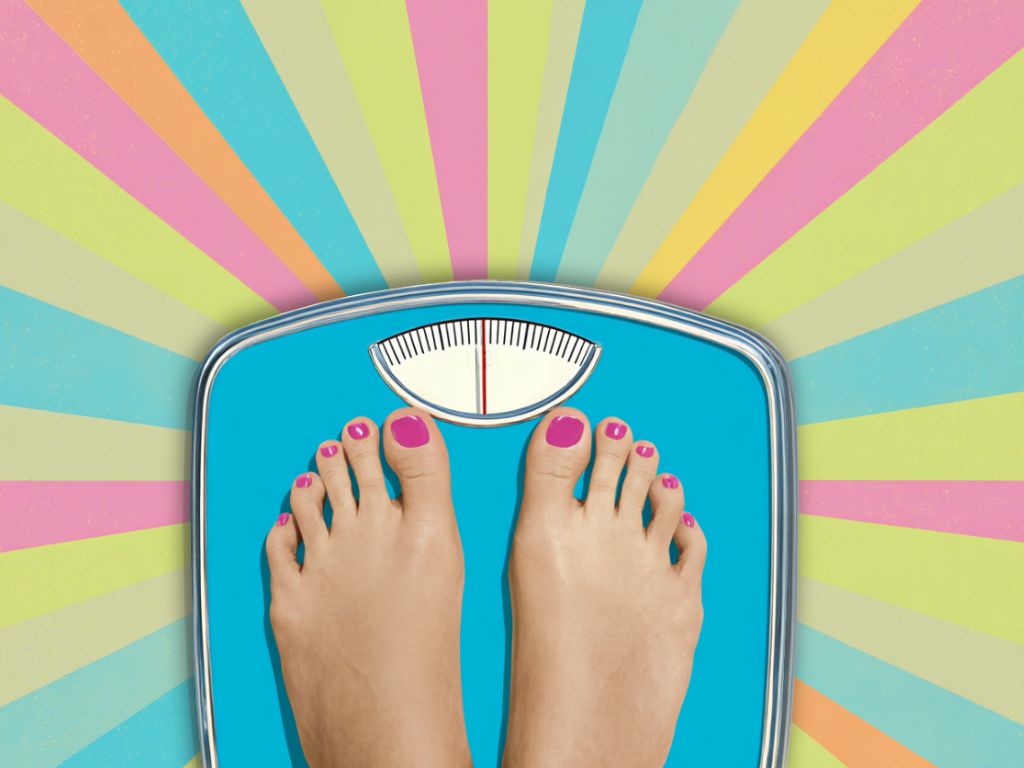
It’s time to retire the metric that was never designed for women in the first place.
Every year, brilliant, capable women over 50 walk out of their doctor’s office feeling like a failure. All because of three little letters: BMI.
As a dietitian, I’ve seen this story play out more times than I can count. A routine physical ends with a doctor punching a few numbers into a calculator, pointing to a chart, and delivering that same tired, oversimplified line: “Your BMI is too high. You need to lose some weight.”
And just like that, they leave feeling like their entire health, and sometimes their worth, is reduced to a number on a chart—one that doesn’t account for strength, vitality, joy, or the life lived in that body.
Let’s be clear: That number is garbage. It’s an outdated, sexist, and lazy shortcut that has no business being the gatekeeper of your health. You are not broken; the system is. And you deserve so much better.
The BMI Was Built for Men. And It Shows.
The body mass index (BMI) was invented by a Belgian mathematician in the 1830s—not a doctor, not a woman, and definitely not someone thinking about menopause.
His goal was to identify the “average man” for population-level statistical studies, using data from white, European male soldiers. The formula was never intended to assess individual health. But decades later it seeped into modern medicine, and insurance companies adopted this non-medical formula to predict mortality rates across large groups—not to diagnose individual people.
How can a statistical tool designed for 19th-century populations make accurate judgments about your personal health today? It can’t—especially if you’re a woman. And that’s the problem.
Why BMI Fails Women Over 50
BMI is a simple calculation: your weight in kilograms divided by the square of your height in meters (kg/m²). That’s it. It only considers two numbers, telling you nothing about your heart health, bone density, cognitive function, or any other meaningful measure of well-being. And it certainly doesn’t say anything about your self-worth.
The one-size-fits-all absurdity of BMI is harmful to everyone, but it becomes especially damaging for women as we age. What’s missing from that simple height-and-weight equation?
Everything that actually matters.
BMI doesn’t distinguish between fat and muscle, which is a critical oversight, especially for middle-aged women. As we move through menopause and beyond, our body composition naturally changes. We tend to lose muscle mass (a process called sarcopenia) and our fat distribution shifts. This means a woman could be considered “overweight” based on the BMI and then fall into the “healthy” BMI range simply because she’s lost muscle mass, not because her overall health has improved. The BMI system “rewards” her for getting weaker!
On the flip side, a woman who strength trains and maintains healthy muscle mass might find herself labeled “overweight” or even “obese” on the BMI chart, simply because muscle is denser than fat. Once again, BMI fails to tell the full story of what’s really happening in the body.
Think about it: A 170-pound woman who’s strong and active is categorized the same as a 170-pound woman of the same height who’s sedentary and has low muscle mass. The BMI chart sees them as identical, but their health realities are worlds apart.
The Emotional Damage of a Meaningless Number
Beyond its scientific shortcomings, one of the most harmful aspects of BMI is psychological. Being slapped with an “overweight” or “obese” label based on an arbitrary calculation can feel deeply shameful. It reduces your entire being—your habits, vitality, and strength—to a single data point that implies you’re falling short.
For women who’ve spent decades navigating a society fixated on weight, this label can be especially devastating. It reinforces the toxic idea that our worth is tied to a number on a scale—a lie we’ve been fed our entire lives. I’ve seen it trigger anxiety, fuel disordered eating patterns, and erode trust in the health care process, making it harder for patients to feel supported on their wellness journey. It makes women feel judged and unseen in the very place they should feel supported.
What to Look At Instead
So, if we’re calling BS on BMI, what should we focus on instead? As a dietitian, I encourage my clients to look at a collection of data points that paint a far more accurate and empowering picture of their health.
Metabolic Health Markers
This is the real data. Your annual lab work tells a much richer story than your BMI ever could.
- Blood Pressure: A key indicator of cardiovascular health.
- Cholesterol Levels (HDL, LDL, Triglycerides): These numbers give insight into your risk for heart disease.
- Fasting Blood Sugar and Hemoglobin A1c: These markers are crucial for assessing your risk for type 2 diabetes.
If these numbers are in a healthy range, you’re doing a lot of things right, regardless of what the BMI chart says.
Body Composition
Are you carrying healthy muscle mass or a higher percentage of fat? How do you feel? Are you strong enough to carry your groceries or get up from the floor with ease? Your strength, mobility, and energy levels are real-world indicators of your body composition and overall health.
Cognitive Function
Your brain health is a vital part of your overall well-being, especially as you age. Are you staying mentally sharp? Do you feel focused and alert throughout the day?
Reclaim Your Health Narrative
Here’s the bottom line: We have better ways to measure health. Why are we still clinging to a 200-year-old formula cooked up by a man who wasn’t even thinking about your body?
The next time a doctor brings up your BMI, don’t let that number define you or derail the conversation. If they focus on the “category” you fall into, use it as an opportunity to start a dialogue. Ask them directly: “Beyond my BMI, how is my actual health? What do my blood pressure, cholesterol, and blood sugar tell you about my body?”
This question reclaims your power. It shifts the focus from a lazy, outdated metric to what truly matters. It forces a more productive, personalized conversation about your well-being, even if some of those lab numbers aren’t exactly what your provider wants to see.
Remember: Your health is your story—not their statistic.
******
MEDICAL ADVICE DISCLAIMER
DISCLAIMER: This website does not provide medical advice. For health or wellness-related content, SFD Media LLC emphasizes that information about medicines, treatments, and therapeutic goods (including text, graphics, and images) is provided for general information only. No material on this site is intended to substitute for professional medical advice, diagnosis, or treatment. Users are advised to independently evaluate and verify the accuracy, reliability, and suitability of the information before relying on it. You should not rely on the content as a substitute for professional medical advice. Consult with a physician or other health care professional for any health concerns or questions you may have. SFD Media LLC is not responsible for any action taken based on the information provided on this website. The use of any information provided on this website is solely at your own risk.







8 Responses
And just so you ladies know – my son – who is only 14 – tells me that if he sees “bony” he is “turned off.” He was trying to support my 160 lbs lol Bless him.
This is so funny because I was just talking about this with my son! I told him that I am “supposed to weigh 115” but I do NOT like the way 115 FEELS OR looks on me! I feel best at 120.
*coasting along at 160 at the moment lol*
Thanks Michelle, I needed this LOL moment. So cool that you talk to your son about this. The outdated formula doesn’t know a damn thing about how you feel. I have been charted as ‘obese’ all my life as a size 12. Our best weight is the one that lets us actually enjoy our lives — not the one a chart from the prehistoric ages assigns.So glad you are here. —susan
I always thought BMI was bs. Thanks for this informative article!
This antiquated method from measuring health has prevented me from having a hip replacement. And I know I’m not alone. Only when it got to the point where I had no ball left on the end of my femur, and literally no hip joint left.Because it had been eaten by the arthritis.Was the surgeon willing to go to bat for me.
I hate hearing this, and I am so sorry this happened to you. My hope is that over time we can just stop with the BMI!!
Thank you, thank you, Thank you.
I literally scoff and snort when told my BMI number. I already know I need to lose more weight, but thst stupid little number does not account for the loss of height when someone has severe spine issues that literally flatten the discs between the vertebrae amd rob a person of their normal height.
It’s an idiotic measurement that has absolutelyno place in our medical care.
I’m headed for a knee replacement and the first surgeon I saw fixated on my BMI. I don’t think I’ll be using him.
I experienced something very similar. Good for you for trusting your instincts and walking away from a surgeon who reduced your medical care to a number on an antiquated chart. That’s not medicine.
Wishing you the very best on your knee replacement journey—and cheering you on as you choose the doctor who actually sees you, not your BMI.
We’re glad you’re here.—susan